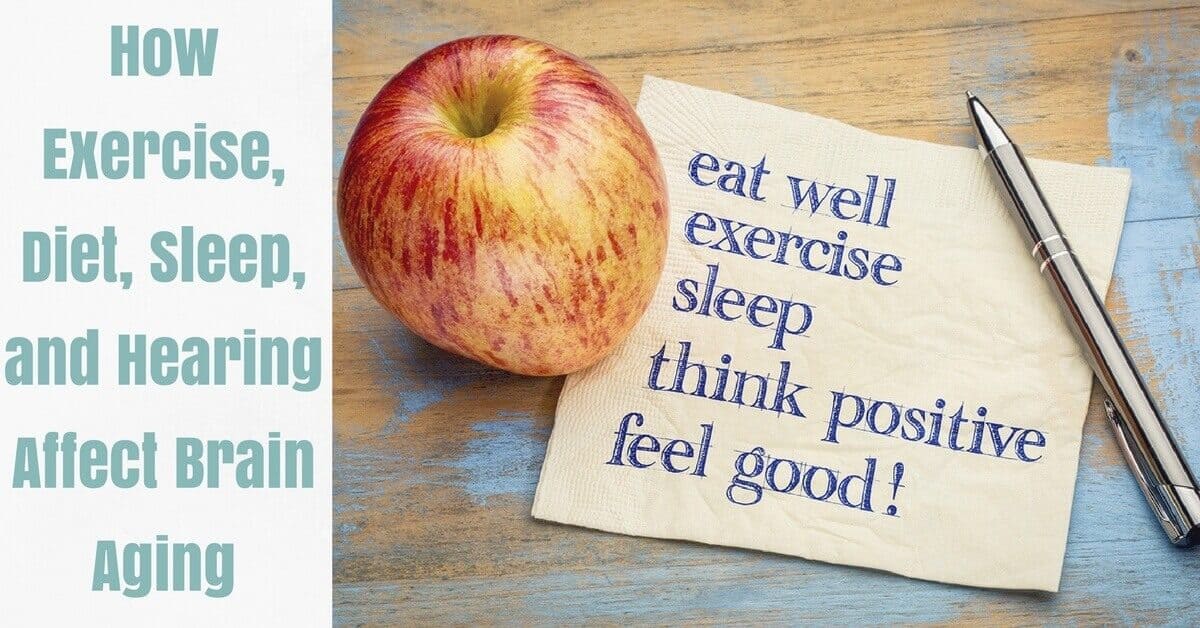Everyone knows that exercise, diet, and sleep play a big role in your overall health. We know things like diabetes and heart problems can be minimized by taking a walk or choosing to eat fruit rather than a cookie. But did you know that exercise, diet, sleep, and hearing are the four biggest factors that impact the aging of your brain?
Brain Aging
Dr. Stephen M. Stahl from the University of California San Diego presented at the 2017 Neuroscience Educational Institute Congress and shed some light on brain aging. “In normal aging, our brains slow down,” says Stahl. “Intelligence remains stable, but we become less mentally flexible. We have longer processing time and declines in motor, sensory, and cognitive abilities.” Aging also plays a role in the shrinkage of white matter in the brain, further reducing processing time, and impacting cognition. While brain aging is a normal part of getting older, there are a few things you can do to slow this aging and keep your wits sharp.
Exercise and Aging
Exercise is extremely important for overall health. You don’t need to go to the gym to get exercise, but it’s recommended that you do something active every day, whether it’s playing with the grandkids in the backyard or talking the dog for a walk around the block. Whatever your exercise style, you’ll see great health improvements. Both short, moderately intense exercise or longer, mild exercise show improved cognitive ability such as increases in attention, processing speed, episodic memory, and decision making.
A recent study that looked at exercise levels in adults over the age of 65 found that those who exercised a few times a week maintained brain health and didn’t struggle with rapid cognitive decline. In fact, adults who exercised 3 or more times each week were 32% less likely to suffer from dementia! That’s a great reason to go for a walk and find ways to stay active.
Diet and Aging
Dr. Stahl also discussed the affects of diet and brain aging. For overall health, as well as brain health, a diet high in fruits and vegetables, and low in red meats and processed meats is most recommended. The Mediterranean diet, for example, recommends a high consumption of legumes, nuts, fruits, vegetables, and healthy oils such as olive oil. In this diet, fish and chicken replace red or processed meats. These diets are linked to improved brain health and cognitive function, as well as less cognitive decline, and a lower risk of developing dementia or Alzheimer’s.
Sleep and Aging
You know how important it is to get a good night’s sleep, and struggle to get up in the morning after a sleepless night. After a few days of poor sleep, you’ll have trouble concentrating on tasks, and are likely to be irritable or easily upset. Sleeping properly is often a struggle for older adults, with around half of all seniors fighting with insomnia or some type of sleep disordered breathing. To get a good night’s sleep, avoid drinking coffee or caffeinated beverages in the evening, get enough exercise, and turn off the TV at least an hour before going to bed since the bright lights mimic daylight, and can inhibit sleep.
Hearing and Aging
Hearing loss has long been associated with a lot of negative health outcomes like social isolation, anxiety, depression, and rapid cognitive decline. Living with untreated hearing loss also speeds up brain aging in a terrible example of use it or lose it. With hearing loss, the areas of the brain associated with hearing aren’t being fully utilized, and soon the cells in these regions start to degenerate. Hearing loss is linked to major brain atrophy, particularly in the temporal cortex. Hearing loss affects nearly 2 in 3 Americans over the age of 70, and all risk severe negative health outcomes.
Treating Hearing Loss
Thankfully, just like exercising or changing your diet, treating your hearing loss can protect your brain from rapid aging. Treating hearing loss can even result in cognitive improvement, so not only will you be hearing better, you’ll be helping your brain function better.
Exercising, eating well, and treating your hearing loss are all great ways to keep your brain healthy, and enjoy great quality of life. Visit us today at My Hearing Centers to treat your hearing loss and do the right thing for your brain.


